Congress awarded businesses that suffered losses because of Hurricane Katrina tax breaks worth nearly $8 billion in the closing days of 2005, but the breaks exclude hospitality industry businesses such as liquor stores, casinos, and golf courses.
The Gulf Opportunity Zone Act of 2005 passed December 16, nearly four months after Katrina devastated New Orleans and other areas of the Gulf Coast. In addition to the business tax breaks, the bill offers special tax-exempt bond authority to local governments to rebuild damaged infrastructure and tax credits to eligible property owners to build more low-income housing in the hurricane-ravaged region.
“It’ll help to get our local government back on its feet. It’ll make a huge contribution to restoring and rebuilding our city,” said Rep. William Jefferson (D-LA) to Associated Press reporter Mary Dalrymple for a December 17 article.
Hospitality industry businesses were excluded from the tax breaks, however, at the insistence of Rep. Frank Wolf (R-VA).
Budget Crunch Cited
“I believe fair-minded Americans would support tax incentives to spur business reinvestment along the hurricane-ravaged Gulf Coast to help victims there rebuild their lives,” Wolf said in a statement he made on the House floor October 27. “But I also believe they would draw the line as Congress has historically done in using taxpayer dollars to assist businesses such as massage parlors, casinos, golf courses, and liquor stores.”
Wolf added, “Giving tax breaks to massage parlors, casinos, liquor stores, and golf courses while we cut federal programs for the less fortunate cannot be explained to the American people.”
Defenders of the hospitality industry argue their jobs are also important and help drive economic growth in the region.
Industry Criticizes Restrictions
“The idea that legal businesses, which pay billions annually in federal, state, and local taxes, would be excluded from the benefits of disaster relief assistance is the worst kind of public policy precedent,” said Mark Gorman, senior vice president of government affairs at the Distilled Spirits Council of the United States.
One week before Congress’s passage of the legislation, Chris Young, director of the Louisiana Association of Beverage Alcohol Licensees (LABAL), said in a statement, “It is estimated that about 5,000 small businesses that sell beverage alcohol remain shuttered across southern Louisiana. Almost all are small, family businesses that desperately need help to recover.”
Steve Stanek ([email protected]) is managing editor of Budget & Tax News.




